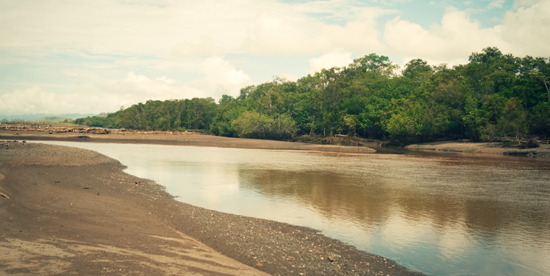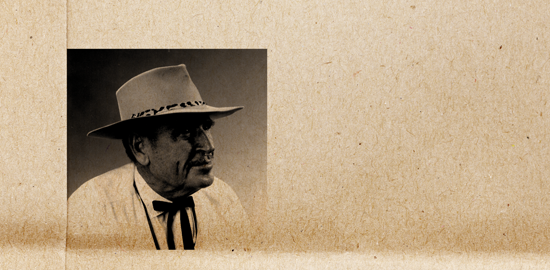
APRIL-MAY 2012
Rethinking
Outreach
Digital Edition
----------------------
History Resources
|

A Long Obedience in the Same Direction
by Brenda Evans
Pop’s toes were gnawed on, some gnawed
off. But that was what pushing through
jungles and tangled mountain terrain does
to a man’s feet. Besides, it was his own knife that
did the gnawing. On the up side, his pointed-toe boots fit better.
When a man is restless for God, he does what he has to do. Converted at 13 and committed to obedience in carrying the gospel at 17, Pop Willey was driven by an unquenchable compulsion. Souls were dying.
The first time I saw Thomas H. Willey, I was a college student. He and Mom (his wife Mabel) had just come out of Cuba where Castro the revolutionary had declared himself Castro the Communist. Pop was tall, mustachioed, and imposing in a rugged, outdoorsy way. He looked like a man who had been to hard places, done hard work, and enjoyed it to the bone.
Two years later I saw Pop again. His boots made a soft clatter on the stairs to our apartment over a house church my husband Bill pastored in northern New Hampshire. A cowboy hat skimmed Pop’s ears. His “gotcha” grin, I learned, was the afterglow of his previous day’s audience with the artist Norman Rockwell. He towed an easel in one hand and a bag of paint in the other.
They were home from the field because of Castro, but Pop’s heart was not home. It remained in Cuba, Panama, and Peru where men were still untouched by the gospel.
While with us, Pop captured the White Mountains of New Hampshire on canvas by day, and by night he and Mom spoke in fledgling evangelical churches, fanning the flame for missions. Pop told of canoe trips deep into the Peruvian and Panamanian jungles and across rough mountains in western Cuba toward the unreached.

Recently, I revisited both Mom and Pop Willey’s biographies. Yearnings rose from the pages. Yearnings to live with warmth, daring, adventure. To break new paths, engage new challenges. But most pungently, yearnings to live guided, obedient lives. From age 17 until his death at 70, Pop was captured by Christ’s final command to “Go into all the world.”
To young ministry and missions students, Pop often said, “It is not where you are that makes you a missionary. It is what you are.” By what you are, Pop meant obedience. He knew that was hard. By nature, Pop was a mule, not a lamb. Not naturally compliant or meek, submission to the will of another was not easy for Pop. But his obedience to the Lord’s call was unwavering.
Pop, or Tom as he was known in earlier days, began his faith journey with an education at Asbury Seminary, where he was at first refused admission because he had only a third- grade education. He longed to be “a man of one Book,” so after long remediation in their academy, he was admitted to seminary. After his senior year, he headed to Peru where an 18-day trek by train, car, mule, and long canoe—in that order—brought him deep into the jungles of the Amazon Basin.
The Campas Indians with lurid red and black face paint, the screams of frightened monkeys, the bark of a leopard seized Tom’s heart. Overhead loomed a canopy of trees; below, a tangle of undergrowth. Humid air vibrated with the cries of beasts, birds, insects, but Tom felt embraced by an unexplainable peace.
The white missionaries already working among the Campas were a different matter. Tension and complaints surged among them. Disturbed by what he saw, Tom spent more and more time with the Campas, especially twin boys who became his inseparable companions romping through the jungle to hunt and play.
Later, Tom understood the tension had been spawned by spiritual and physical exhaustion. At Asbury, he had learned that obedience to the Lord included tending to his own physical and psychological needs, and so he painted to soothe his tired soul. For a restless young missionary whose urge was to always push on and on, it was a valuable lesson.
Tom’s year among the Campas set the course for his long years in missionary work. He was drawn toward the remote, the hard to reach, the untraveled way. And especially toward those untouched by the gospel. Personal comfort was never his motivation.
But in the Peruvian jungle in 1928, Tom, an avowed bachelor, admitted for the first time that marriage was no longer secondary to him. Back in the states, at age 32, Tom declared to a casual acquaintance, the 25-year-old Mabel Bailey, “The Lord wants you to marry me.” Eventually, with the Lord’s approval, Mabel agreed. Within a few years they birthed a son and daughter, Tommy and Barbara.
The couple quickly became known for fearless obedience to God’s call to frontier missions. Near the end of 1936, Tom began a three-month scouting trip to Panama in search of Choco Indians, an unreached tribal group. Aboard a banana boat, he headed toward the southeastern province of Darien. Then paddling a piragua, a needlelike canoe hollowed from a log, Tom and a friend made their way up the Sambu River to a Choco village.
“I have a great message for you,” Tom told the chief, “a message about God.” Bewildered, the chief said he had not heard of God, knew no word for Him. Tom knew he had found the people he had sought—those who had never heard.
In Peru, Panama, Cuba, and every other place he ministered for 40 years, Pop was propelled forward by his determination to reach those who had not heard the gospel or seen the book called the Bible. By foot, canoe, horseback, he pressed on to “do the undone,” as one biographer said.
Pop demonstrated obedience to Christ in the way he lived. In pastoral theology at Cedars of Lebanon seminary in Cuba, he “lectured” through gab sessions sprinkled with humorous stories, personifying love. Live it was his point: “Be imitators of me as I am of Jesus Christ.”
Pop faced the extreme claim of obedience in Cuba in January 1959. Batista was out, Castro was in, and Batista’s supporters were dying by firing squad. Pop felt compelled to speak Jesus’ salvation to those going to the wall each day. And so he did. By December of 1961, Castro had declared himself a Marxist-Leninist and closed Cuba to American missionaries. Mom and Pop moved permanently out of Cuba and into a stateside ministry.
But Pop was restless. Stateside wasn’t for him. In 1964, he wrote to his son Tom in Panama:
“What about a mule or husky horse? You’d better begin to make a list of what I need—mosquito net, boots. Can I get a poncho down there? A pith helmet?....My health is OK. Just weak in the feet, and I know how important good feet are....hard to wait.”
By the end of 1964 he was back in his boots in a dugout canoe headed up the Sambu River in southeastern Panama toward his beloved Choco Indians.
When Pop Willey died in 1968, I imagined that he died with his boots on. Worn, pointed-toe boots on gnawed, obedient feet. That image still reaches into my soul, urging me on, speaking its challenge: Live a life of long obedience in the same direction.
About the Writer: Brenda Evans, a retired English teacher, lives in Catlettsburg, KY, with her husband Bill. She speaks regularly at women's conferences and retreats, and is currently writing a memoir.
|
|

